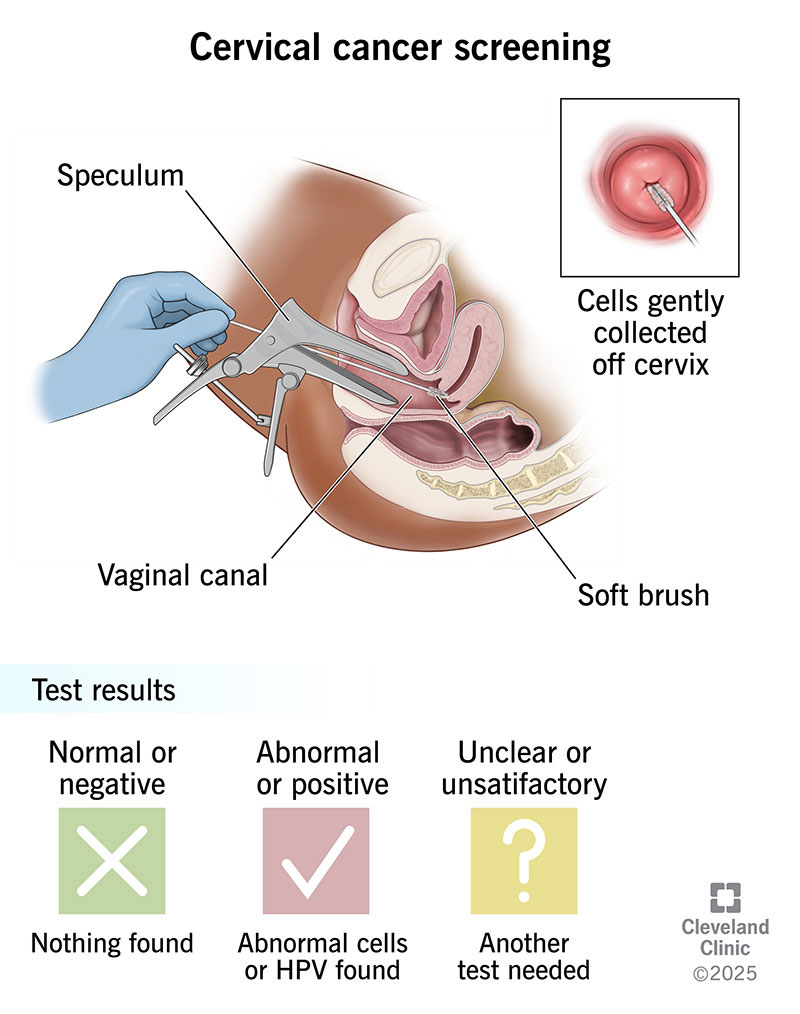Cervical cancer screenings check for signs of cervical cancer and precancer before you have symptoms. They lead to early diagnosis and treatment that can prevent cervical cancer. Screening methods include Pap tests, HPV tests and HPV/Pap cotests. People of average risk of developing cervical cancer need routine screenings from ages 21 to 65.
Advertisement
Cleveland Clinic is a non-profit academic medical center. Advertising on our site helps support our mission. We do not endorse non-Cleveland Clinic products or services. Policy

Image content: This image is available to view online.
View image online (https://my.clevelandclinic.org/-/scassets/Images/org/health/articles/cervical-cancer-screening)
Cervical cancer screenings are tests that detect early-stage cervical cancer or precancerous cells in your cervix before you have symptoms. There are three screening methods your healthcare provider may use:
Advertisement
Cleveland Clinic is a non-profit academic medical center. Advertising on our site helps support our mission. We do not endorse non-Cleveland Clinic products or services. Policy
Most people should start cervical cancer screenings at age 21 and get them until age 65. This is the case even if you’ve gotten the HPV vaccine. The vaccine prevents most cancer-causing strains of HPV but not all of them.
Even if you’re in between these ages and have never been screened, it’s not too late to start. And the benefits are well worth any dread or jitters about visiting the doctor. Screenings prevent cervical cancer. They allow your healthcare provider to detect and treat precancer in the early stages, preventing the progression to cancer.
Your healthcare provider will collect a sample of cells from your cervix with a soft brush and send it to a lab for testing. The lab will check for signs of HPV (HPV test), abnormal cells (Pap test) or both (HPV/Pap cotest).
The U.S. Preventive Services Task Force publishes cervical cancer screening guidelines for people of average risk based on age. You may need more frequent screenings if your risk for cervical cancer is higher than average. Your provider may consider you high-risk if you’re immunocompromised or if you’ve had abnormal results on a previous cervical cancer screening test.
Advertisement
If you’re in this age range, you should get a Pap test, with follow-ups every three years if the results are normal.
Screenings shouldn’t start earlier than age 21, even if you’re already sexually active (and at risk of HPV infection). This is because HPV infections among people in this age group often go away on their own. Also, not all cervical precancers develop into cancers. The ones that do often take several years to do so.
In fact, given how slowly these cancers progress (and the effectiveness of the vaccine), the American Cancer Society recently updated its recommendations for cervical cancer screenings. Its recommendation is to get the HPV test every five years, starting at age 25.
Your healthcare provider (your gynecologist or primary care physician) will recommend the screening schedule and tests that make the most sense for your health.
There are a few options if you’re in this age range. Your healthcare provider may recommend:
Your healthcare provider will give you instructions to help you prepare. They may ask that you:
In some cases, your provider may still be able to do the test during your period. Ask them to advise you.
You may have light bleeding after your healthcare provider removes cells from your cervix. But the bleeding doesn’t last long. Pap smears and HPV tests are both safe procedures that are essential in the fight against cervical cancer.
It may take up to three weeks to get your test results. Here’s what they mean:
An abnormal result doesn’t mean you have cervical cancer. In fact, most abnormal cervical cells are related to noncancerous causes, like infection or irritation. Still, you’ll need more tests to know for sure. You may need:
Advertisement
Biopsy results show if abnormal cells are cervical cancer, precancer or unrelated to cancer.
Contact your healthcare provider if you have questions about cervical cancer screenings. Questions to ask include:
Cervical cancer cases and deaths have been in decline for the past several years thanks to preventive measures like cervical cancer screenings and the HPV vaccine. While getting a Pap or HPV test isn’t something most of us exactly look forward to, these tests are essential. Detecting and treating precancers can prevent cancers from forming. Early cervical cancer detection and treatment can often cure it. Screenings can save your life. Make cervical cancer screenings a routine part of your care.
Advertisement

Sign up for our Health Essentials emails for expert guidance on nutrition, fitness, sleep, skin care and more.
Learn more about the Health Library and our editorial process.
Cleveland Clinic’s health articles are based on evidence-backed information and review by medical professionals to ensure accuracy, reliability and up-to-date clinical standards.
Cleveland Clinic’s health articles are based on evidence-backed information and review by medical professionals to ensure accuracy, reliability and up-to-date clinical standards.
From routine pelvic exams to high-risk pregnancies, Cleveland Clinic’s Ob/Gyns are here for you at any point in life.
